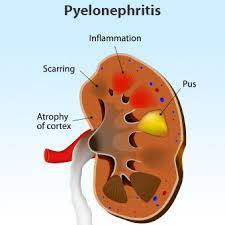CEN Pyelonephritis
CEN Pyelonephritis Overview
Kidney infection (pyelonephritis) is a type of urinary tract infection (UTI) that generally begins in your urethra or bladder and travels to one or both of your kidneys.
A kidney infection requires prompt medical attention. If not treated properly, a kidney infection can permanently damage your kidneys or the bacteria can spread to your bloodstream and cause a life-threatening infection.
Kidney infection treatment, which usually includes antibiotics, might require hospitalization.
Signs and Symptoms
- Fever
- Chills
- Back, side (flank) or groin pain
- Abdominal pain
- Frequent urination
- Strong, persistent urge to urinate
- Burning sensation or pain when urinating
- Nausea and vomiting
- Pus or blood in your urine (hematuria)
- Urine that smells bad or is cloudy
Causes
Bacteria that enter your urinary tract through the tube that carries urine from your body (urethra) can multiply and travel to your kidneys. This is the most common cause of kidney infections.
Bacteria from an infection elsewhere in your body also can spread through your bloodstream to your kidneys. Although it’s unusual to develop a kidney infection, it can happen — for instance, if you have an artificial joint or heart valve that becomes infected.
Risk Factors
- Being female. The urethra is shorter in women than it is in men, which makes it easier for bacteria to travel from outside the body to the bladder. The nearness of the urethra to the vagina and anus also creates more opportunities for bacteria to enter the bladder. Once in the bladder, an infection can spread to the kidneys. Pregnant women are at even higher risk of a kidney infection.
- Having a urinary tract blockage. This includes anything that slows the flow of urine or reduces your ability to empty your bladder when urinating — including a kidney stone, something abnormal in your urinary tract’s structure or, in men, an enlarged prostate gland.
- Having a weakened immune system. This includes medical conditions that impair your immune system, such as diabetes and HIV. Certain medications, such as drugs taken to prevent rejection of transplanted organs, have a similar effect.
- Having damage to nerves around the bladder. Nerve or spinal cord damage can block the sensations of a bladder infection so that you’re unaware when it’s advancing to a kidney infection.
- Using a urinary catheter for a time. Urinary catheters are tubes used to drain urine from the bladder. You might have a catheter placed during and after some surgical procedures and diagnostic tests. You might use one continuously if you’re confined to a bed.
- Having a condition that causes urine to flow the wrong way. In vesicoureteral reflux, small amounts of urine flow from your bladder back up into your ureters and kidneys. People with this condition are at higher risk of kidney infection during childhood and adulthood.
Treatment
Antibiotics are the first line of treatment for kidney infections. Which drugs you use and for how long depend on your health and the bacteria found in your urine tests.
Usually, the signs and symptoms of a kidney infection begin to clear up within a few days of treatment. But you might need to continue antibiotics for a week or longer. Take the entire course of antibiotics recommended by your doctor even after you feel better.
Emergency Room Certification Courses
Overview
- Elite Reviews Offers A Variety Of Online Courses That Will More Than Adequately Help Prepare The Emergency Nurse To Pass The National Exam.
- Each Course Includes Continuing Education Credit and Sample Questions.
Continuing Education
- Each Of Our Online Courses Has Been Approved Continuing Education Contact Hours by the California Board of Nursing
- Login To Your Account In Order To Access The Course Completion Certificate Once The Course Is Complete.
CEN Free Trial
- FREE Sample Lecture & Practice Questions
- Available For 24 Hrs After Registration
- Click Free Trial Link To Get Started – CEN Free Trial
How It Works
How The Course Works
- First – Purchase The Course By Clicking On The Blue Add To Cart Button – You Will Then Be Prompted To Create A User Account.
- Second – After Creating An Account, All 3 Options (90, 120 or 150 Days) Will Be Listed. Select The Option You Desire And Delete The Other Two.
- Third – You Will Be Prompted To Pay For The Review Using PayPal – After Payment You Will Be Redirected Back To Your Account.
- Last – Click The Start Button Located Within Your Account To Begin The Program
- 175 Sample Questions
- Q & A With Rationales
- Approved For 5 CEU’s
- 90 Days Availability
- Cost $75.00
- 1250+ Sample Questions
- Q & A With Rationales
- Approved For 25 CEU’s
- 90 Days Availability
- Cost $200.00
CEN Practice Questions Bundle
- 1350+ Sample Questions
- Q & A With Rationales
- Approved For 30 CEU’s
- 90 Days Availability
- Cost $225.00
CEN Review Course
- Option 1
- Lectures & 1250+ Questions
- Approved For 35 CEU’s
- 90 Days Availability
- Cost $325.00
- Option 2
- Lectures & 2000+ Questions
- Approved For 40 CEU’s
- 90 Days Availability
- Cost $350.00
CEN Review Course Bundle
- Option 3
- Lectures & 3000+ Questions
- Approved For 70 CEU’s
- 90 Days Availability
- Cost $375.00








